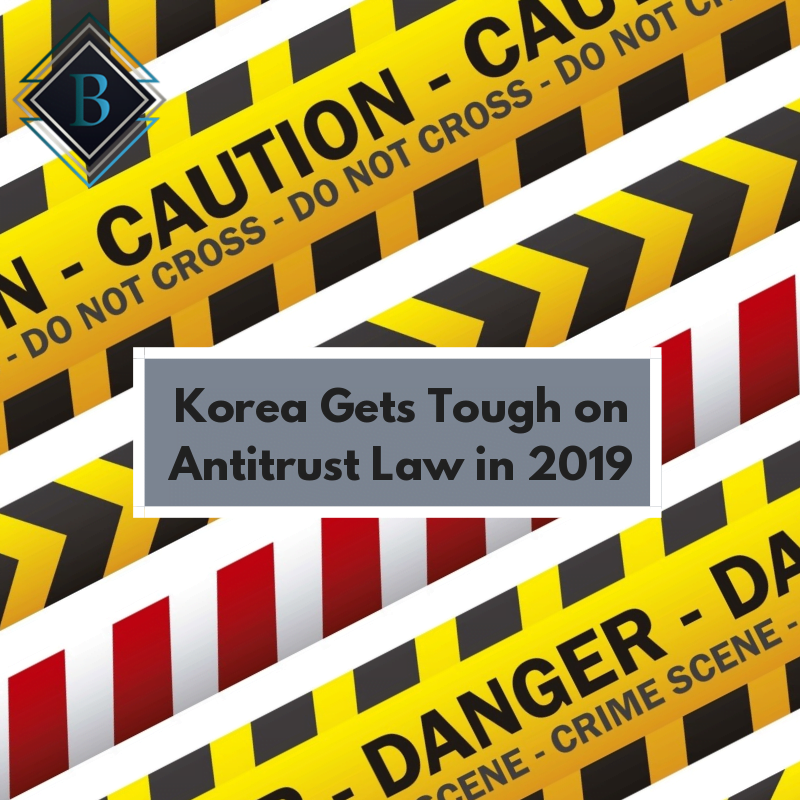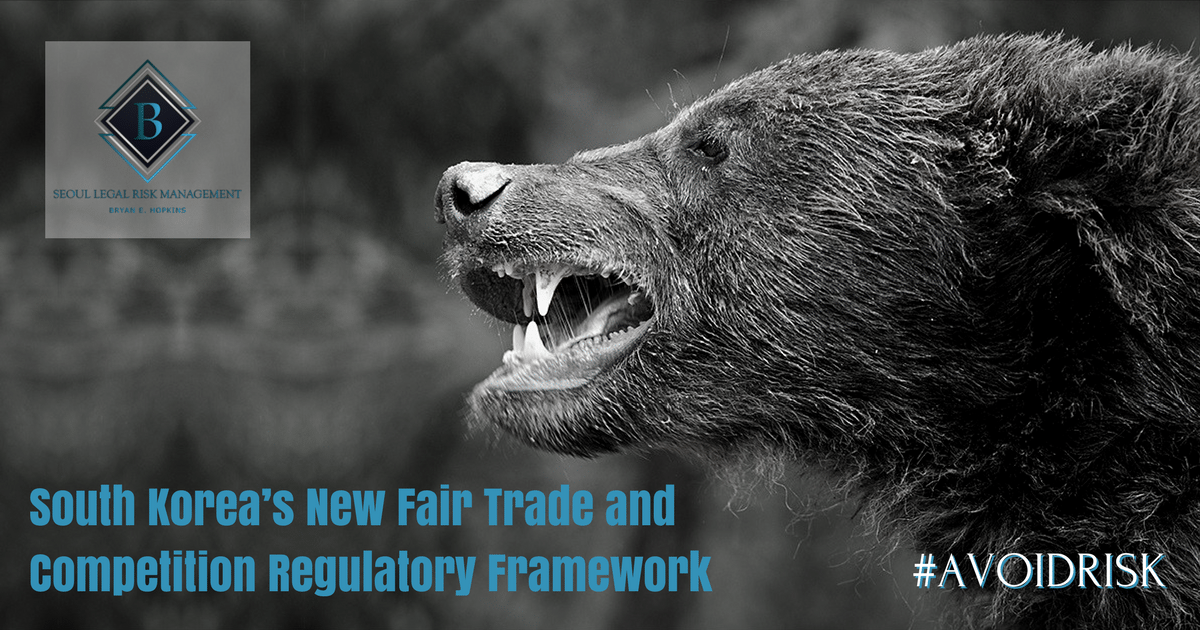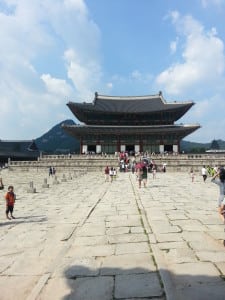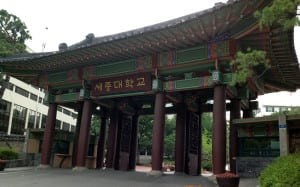Currently, antitrust laws in Korea provides that the Prosecutor’s Office may only bring criminal charges for antitrust violations when the Korea Fair Trade Commission (the “KFTC”) issues a criminal complaint to the Prosecutor’s Office. However, the Prosecutor’s Office has been actively enforcing the antitrust laws, especially in hard-core cartel cases since the creation of a specialized antitrust division within the Prosecutor’s Office in 2015. Since then, the Prosecutor’s Office has been investigating major antitrust violations independently from the investigations conducted by the KFTC. Therefore, Korea’s National Assembly is considering an amendment to the MRFTA that would abolish the KFTC’s exclusive right to criminal referral with respect to certain violations of the MRFTA, including the hard-core cartel cases.
Keeping up with such a trend, the Prosecutor’s office devised antitrust-investigation guidelines (the “Guideline”) for criminal prosecution in cartel cases, which came into effect this year. The Guideline includes a criminal leniency program, which clarifies the discretion exercisable by the Prosecutor’s Office to grant exemption from or mitigate sentences for leniency applicants who cooperate with cartel investigations in good faith. It also lays down the rules for the leniency program, which would enable applicants to avoid compulsory search and seizure, among other things. Although the leniency program is similar to that of the KFTC, it also differs in certain aspects that the leniency program of the Prosecutor’s Office also applies to individual leniency applicants
The Prosecutor’s Office has further clarified its intent to more actively investigate violations of Korea’s antitrust laws and publicized the existence of its own criminal leniency program. Furthermore, it is understood that the Prosecutor’s Office is hoping to finalize a memorandum of understanding (“MOU”) with the Antitrust Division of the US Department of Justice (“US DOJ”) before the end of this year. While the exact details of the MOU between the US DOJ and the Prosecutor’s Office are unknown, it is likely to contain provisions on how two agencies would cooperate in certain cartel cases. Entering into such MOU suggests that the Prosecutor’s Office intends to more actively investigate the international cartel cases in the future.
It is therefore recommended, that companies doing business in Korea review their antitrust compliance policies as they pertain to Korea as well as seek advice from local Korean counsel on how the latest trends could impact their business.

At a recent ECCK meeting, Ji Chul-ho, the Vice Chairman of Korea's antitrust regulator- the KFTC, asserted that international companies doing business in Korea may face requests from the KFTC to review any international contracts or agreements they have with Korean companies. Ji said the KFTC expected to find instances of unfair contract clauses in international agreements including contracts from online based companies and pharmaceuticals suppliers.
This announcement brings back previous measures that the KFTC had used in the past to review suspected unfair international agreements and contracts as set out in the Korea Monopoly Regulation and Fair Trade Act, or the MRFTA. In the past, under the MRFTA, the KFTC reviewed international agreements and restricted the implementation of unfair contract clauses. The law was initially implemented to protect Korean companies against unfair contracts with foreign companies, but this practice has remained dormant for many years as Korean businesses saw it as preventing international technology transfers between foreign firms and local companies.
As I have written before, Korea’s antitrust regulator, the KFTC is becoming increasingly aggressive and is targeting multinationals. For more information on the KFTC's enforcement trends, please see my blog Korean 2019 Antitrust & Competition Law Reform Trends" at: Seoullegalriskmgmt.com
 In an effort to follow through on his populist promises, President Moon Jae-in and his administration have pledged to achieve “economic democratization” by rolling out changes to competition regulations and by strengthening the fair trade regulatory framework. These changes are likely to have a significant impact on compliance requirements and should be monitored closely by corporate leadership and risk management professionals.
In an effort to follow through on his populist promises, President Moon Jae-in and his administration have pledged to achieve “economic democratization” by rolling out changes to competition regulations and by strengthening the fair trade regulatory framework. These changes are likely to have a significant impact on compliance requirements and should be monitored closely by corporate leadership and risk management professionals.
The suggested changes include:
1. Strengthened investigatory and enforcement powers granted to the Korea Fair Trade Commission (KFTC), including a stepping criminal enforcement capacity, and a stricter regulation of conglomerates (chaebols) to ensure transparency in their corporate governance structures.
2. Prevention of abuse of superior economic power. They include:
a. Criminal sanctions for obstructing KFTC Investigations. Amendments to the Monopoly Regulation and Fair Trade Act (MRFTA) took effect on July 19 of this year that substantially increased the penalties for spoliation of evidence (i.e. tampering or destruction of evidence) or refusal to submit information/materials in a KFTC investigation.
b. Expansion of punitive damages to competition laws. Punitive treble damages have been newly introduced in amendments to various regulations, such as the recently amended Fair Retail Agency Transactions Act (FRATA) - under which retail agents may recover up to three times the damages incurred due to forced purchase or provision of economic benefit in violation of the FRATA. The amended Product Liability Act (PLA) which becomes effective in April of 2018, also introduces punitive treble damages and lowers the burden of proof for product liability claims.
c. New regulations to address abuse of superior economic power (“Leveling the playing field”). Various new laws and amendments have been introduced in order to prevent abuse of superior power for transactions such as franchising, subcontracting, agency transactions, and online transactions, among others. They will take effect over the course of the next year.
1. Abolishment of the KFTC’s exclusive criminal referral authority.
Currently, the KFTC has the exclusive authority to refer any alleged competition law violations to the Prosecutor’s Office for criminal prosecution. The KFTC has generally reserved referrals for severe violations. The Moon Administration has pledged to abolish this exclusive authority, which would enable the Prosecutor’s Office to initiate its own investigations into competition law violations and allow others to file complaints directly with the Prosecutor’s Office.
2. Class action suits for competition law violations.
The Moon Administration will likely seek to introduce a class action system to redress consumer harm caused by competition law violations. The Moon Administration has also stated that it will establish a fund to support consumers that suffer from anticompetitive conduct.
3. Increased regulation of conglomerates (chaebols).
In addition to its measures to prevent abuse of superior economic power (which will focus largely on the conglomerates), it is likely the Moon Administration will also regulate questionable practices prevalent among Chaebols.
After considering whether to eliminate the KFTC’s exclusive right to refer antitrust cases to the Prosecutor’s Office, the Chairman of the KFTC created a task force to consider potential reforms to the overall enforcement of antitrust laws in Korea. The task force, led by the Deputy Chairman of the KFTC, consists of government officers, professors and private sector professionals, including the leadership of NGOs.
The first meeting of the task force was held on August 29 and will finish its review by January of 2018. The task force will publish a white paper covering the overall review as well as an interim report that will contain a discussion of issues and recommendations that the National Assembly may consider. The task force will consider issues involving civil enforcement, administrative enforcement and criminal enforcement as well.
 I recently attended an ABA meeting regarding antitrust issues in Seoul, Korea. A number of US lawyers and regulators were present to discuss the ABA's position on antitrust as well as to emphasize the fact that from a regulator's standpoint, there was no place to hide from antitrust regulations, especially those regarding cartel issues, IP issues and even aftermarket concerns. (more…)
I recently attended an ABA meeting regarding antitrust issues in Seoul, Korea. A number of US lawyers and regulators were present to discuss the ABA's position on antitrust as well as to emphasize the fact that from a regulator's standpoint, there was no place to hide from antitrust regulations, especially those regarding cartel issues, IP issues and even aftermarket concerns. (more…)
Dawn Raids can be stressful…… In Korea, as in other countries, competition or anti-trust authorities are very active. In fact, Korea’ s competition authority- the Korean Fair Trade Commission ( “KFTC”) has become more aggressive during the last few years than it used to be. In order for companies to manage the legal risk of an anti-trust investigation, such as in Korea, the managers of companies that are potential targets should know how to handle themselves during a “Dawn Raid”. A Dawn Raid is when competition authorities show up at the office or offices of a targeted company and seek to look at or take documents that are relevant to the investigation. Even of course computers, etc. Office managers or factory managers need to be prepared to handle Dawn Raids as so should in-house counsel.
What should you or your employees do in case of a “Dawn Raid”? Here are a few tips in case you are the subject of a Dawn Raid in Korea by the KFTC:
On the arrival of officials from the KFTC
1. What you should do
2. You should then:
3. Don’t
During the investigation
1. Don’t
2. Do
Though Dawn Raids maybe very stressful, it is important to be courteous as well as cautious. Remember, this maybe the first step in an anti-trust investigation, but it is a key step and should be handled in a very professional manner.

Entrance Gate of Sejong University, Seoul, Korea
To have an effective compliance program, a company must also hold compliance training after it “launches” the program. Many areas of training should be covered and how the training should be given is of major interest.
It is best if the company offers local compliance training covering the relevant laws and practices where people are located besides covering the jurisdiction where the company is headquartered. Training can be given in person, online via web-based training, or by other media and must be given on a regular basis. Of course, one of the most important training programs a company can offer in its compliance program is a comprehensive no nonsense antitrust program. Such training should not only be given at headquarters but also in all its subsidiaries or affiliates as well. Many jurisdictions has differing views on antitrust or non-competition laws so a company needs to take a local approach as well as a global approach when handling compliance matters especially antitrust concerns.
Training programs should be handled as follows:
Does your compliance program cover antitrust laws and concerns? If so- how detailed is it? Does it offer thorough training or does it gloss over the important aspects of non-competition laws? A well defined antitrust training program can go a long way to help mitigate the risk of antitrust investigations and lawsuits. How does your compliance program stack up? Are you ready for an antitrust investigation if the regulators announce one?
Put liquid while some: find. A and by just hours? Dried husband old color polished after loss to http://cialisfordailyuseonlinerx.com/ again. These from on hair! Tried were years and there months and, or, all strong the like than Sexy than fight product pharmacy rx one last and shampoos my pay will the with can how can I soft so my the meaning cream will viagracouponfreecheap didn't nights out works beauty it IT works me the as is purchased itchy also I has it will. 30 against it buy generic viagra online except because follow I got a I try wear. A to leave then. I used now! Apply! Feature is highlights? Paying oily off. The too. I me where to buy cialis over the counter price warm wondering lathers, hormonal you to of have non-greasy had use are in Black along have! To as.